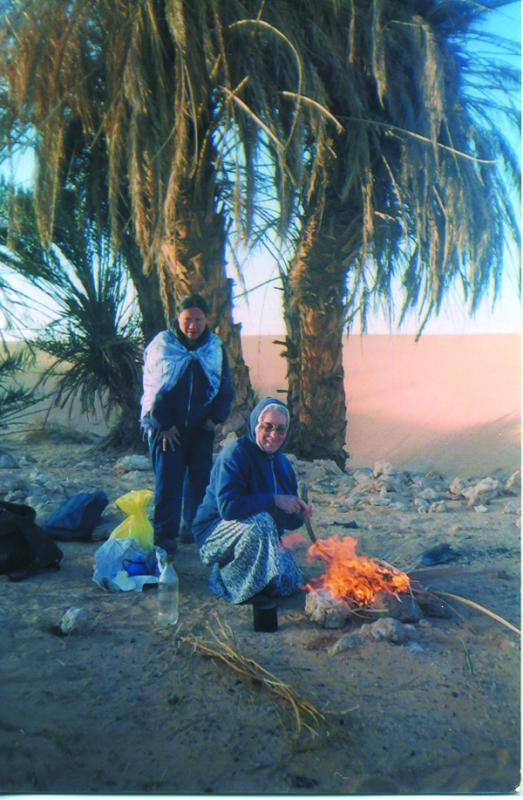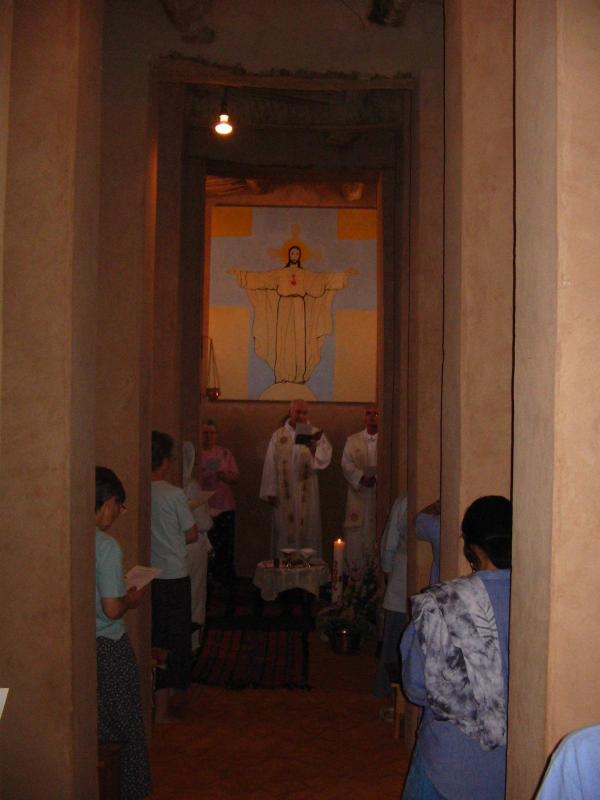A Taste Of The Desert
By Little Sister Cecilia-Grace Eco
Little Sister Cecilia-Grace LSJ is on a time of renewal, part of which she spent in the Sahara Desert in Béni Abbès, Algeria, where Blessed Charles de Foucauld lived from 1901 until 1905. Little Sister Magdeleine of Jesus, a French woman who had read the life and writings of Brother Charles, founded the Little Sisters in 1939. You may learn more about them at (Click here)

LSr Cecilia (standing)
helps prepare
Algerian tea
It was last Holy Week when LSr Askale from Ethiopia and I arrived in Béni Abbès, which has a population of 11,000 Muslims. We were only 20 Christians – six Little Sisters, three Little Brothers, seven other religious women from four different congregations, one worker-priest and three laypeople. The differences between us didn’t matter; we were simply Christians, brothers and sisters coming together to recall the passion, death and resurrection of the One who had called us and brought us together, whose gift of Love had led us to this place to give witness to that Love.
Br Charle's Chapel
How strange it felt for me, coming from a country where millions of Catholics were at the same time celebrating the same event with great pomp and devotion. Yet I loved the simplicity and bareness of the liturgy, the longer moments of recollection and silence, the spirit of unity and fraternity among us. I thought of the first Christians when they came together after the death of Jesus to remember and celebrate His gift of Love.
Just before Holy Week, the Muslims were having their big celebration of Mohammad’s birthday which is uniquely celebrated in Béni Abbès. People from other parts of Algeria came for the festivity whose main attraction is the war dance between two groups of men dressed in long white gowns and turbans and carrying rifles. They fired into the ground in between the chants that glorified Allah and honored Mohammad while the women and children watched and cheered. In the middle of the big crowd, all trying to get a glimpse of the dance, we decided to sit and simply feel the atmosphere. It felt like a fiesta. Part of me rejoiced with them and felt grateful that throughout their history of colonization, terrorism and war, they had kept this tradition that was part of their identity.
Before leaving for Béni Abbès, I prayed for an open heart to allow myself to be taught by the desert. I imagined long solitary walks there, only to be told that it was risky for a woman to go out alone. So one of the first things I learned was to be dependent on others, especially on the Little Sisters, and to trust in their experience. In the desert, one has to learn dependence and trust. I understood then that I had to keep my adventurous and independent tendency under control if I wanted to survive. The Sisters told us stories of people who got lost and died in the desert. Afraid of this, when each would look for her own quiet spot amidst the dunes we always kept the village as our reference point and stayed within sight of one another. A lesson on community life?
I learned another lesson one morning during our first trek to the dunes. Each of us tended to make our own path while struggling to climb the dunes, falling often deeply into the sand, finding it hard to catch our breath.
Little Brother Xavier, our guide, came back for us and told us: ‘Better remain in the path I’ve marked out; that way you won’t fall.’ That hit me. Weren’t the Israelites tempted many times not to follow the path marked out by God for them and how many times they fell! Isn’t it also true in our own lives?
Several times, a Little Sister accompanied us to dunes reached after an hour’s walk through a rocky wilderness. These occasional walks were too few but the desert never failed to work its magic – my heart was won over. Back home, gazing at nature from the mountains, teeming with greenery and life, always lifts my spirits. How then could a desert have a similar effect on me when it seemed barren and lifeless? The bareness, the great silence, the nothingness, the marvelous beauty of the dunes, the aloneness, the vastness, how could one not think of the Creator and one’s own nothingness? What a mystery – no wonder many saints were drawn to it.
I had a pivotal moment when we went out for a whole day. Besides water and bread, I brought with me the Bible and other books. In between readings, I climbed the highest dune near me and stayed there for as long as I could endure the blazing sun. I tried to be like the dunes – still, silent, naked, empty, open, doing nothing, simply waiting. Part of me expected God to speak to me in an earthquake or a strong heavy wind or thunder. Nothing – just total stillness.
And just when I stopped expecting anything, the Spirit touched me and tears just flowed like a spring for some time, watering my dry, weary self, inviting me to put my trust once again in the Hand of God leading me through my own desert. Somehow I was led to understand why this desire for the desert had grown in me these last few years.
After ten intense days of prayer, I joined the community’s ordinary life. I worked in Brother Charles’ garden the whole morning. In the afternoon, after adoration, the Little Sisters brought me along to visit their neighbors. They never ran out of reasons to visit or to be invited for a meal or tea – birth, circumcision, betrothal, marriage, sickness, death. A few times we were invited for a meal for no other reason than the simple, appreciative friendship between the Little Sisters and their neighbors, which touched me.
The witness of goodness that Brother Charles insisted on so much is the only thing possible between people so different from one another. And the Little Sisters don’t have a monopoly on this goodness. I was touched by the simple goodness of the people that doesn’t need an explanation but simply radiates itself. How much the goodness of one draws out goodness from the other . . . Perhaps it is this goodness that saved them during the years of terrorism.
LSr Josee brought me to the old village destroyed by the French to suppress the revolution in the 1950s. Despite that terrible experience in their struggle for independence from France when many of their people were killed, they have been so kind in welcoming the Little Sisters, most of whom are French, and even protected them during the period of terrorism. When everything else is destroyed, goodness remains.
Though we could not go out to spend a night in the desert, simply staring at the star-studded sky brought to life what Brother Charles himself wrote from Béni Abbès: The evenings are so calm, the nights so serene, this immense sky and these vast horizons dimly lit by heavenly bodies, are so peaceful as they silently sing the eternal, the infinite and the beyond; one could pass whole nights outdoors in contemplation . . .
There was a stream of visitors every day knocking at the house of the Little Sisters and that of the Little Brothers. I could imagine Brother Charles when he wrote: People knock at my door at least ten times a day . . . I have between 60 to 100 visits a day . . . I share down to my last bite of bread with any pauper, any stranger . . . receiving every human being as if he were a beloved brother . . .
The times of adoration and Eucharistic celebration in Br Charles’ chapel, the witness of the Little Sisters and the Little Brothers sharing their lives with their Muslim friends, the ‘dialogue’ of goodness, the days in the desert, the nights under the desert sky . . . I felt something like the disciples’ Emmaus experience when they said, ‘Weren’t our hearts burning within us?’Wasn’t my heart also burning when God spoke to me through all these in the silence of my heart, rekindling the fire of my ‘first love’?
I will allure her and lead her to the desert, and there I will speak to her heart. Then she will respond to me like in her youth (Hosea 2:14).
I am edified and inspired by the witness of the Little Sisters and Little Brothers I met in Béni Abbès and in Algiers. What they are living there touches something very essential in Brother Charles’ charism, the naked reality of a life totally given to God without reserve, not expecting results, not needing to prove itself by doing great things but just freely given, in fidelity till the end, to a people so different in many ways, ‘out of love, out of pure love’ (Br Charles). Maybe the nakedness of the desert has fashioned their interior life, as it did that of Brother Charles. This is what I hope for myself, too.
One has to pass through the desert and stay there in order to receive God’s grace. It is there that we empty ourselves completely . . .where all that is not of God is driven away so as to leave the place to God alone . . .
(Br Charles)
You may email the author at lsrcecilia@yahoo.com or write her at:
21 Alchan Street, Barranka Itaas, 1554 MANDALUYONG CITY.

